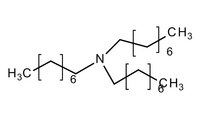808649 Sigma-AldrichTrioctylamine
Trioctylamine for synthesis. CAS 1116-76-3, molar mass 353.68 g/mol.
More>> Trioctylamine for synthesis. CAS 1116-76-3, molar mass 353.68 g/mol. Less<<Synonyms: N,N-Dioctyl-1-octanamine
Recommended Products
Overview
| Replacement Information |
|---|
Key Spec Table
| CAS # | EC Number | Hill Formula | Molar Mass |
|---|---|---|---|
| 1116-76-3 | 214-242-1 | C₂₄H₅₁N | 353.68 g/mol |
Products
| Catalogue Number | Packaging | Qty/Pack | |
|---|---|---|---|
| 8.08649.0010 | Glass bottle | 10 ml | |
| 8.08649.0100 | Glass bottle | 100 ml | |
| 8.08649.0500 | Glass bottle | 500 ml |
| Description | |
|---|---|
| Catalogue Number | 808649 |
| Synonyms | N,N-Dioctyl-1-octanamine |
| References |
|---|
| Product Information | |
|---|---|
| CAS number | 1116-76-3 |
| EC number | 214-242-1 |
| Hill Formula | C₂₄H₅₁N |
| Molar Mass | 353.68 g/mol |
| HS Code | 2921 19 99 |
| Structure formula Image | |
| Quality Level | MQ200 |
| Applications | |
|---|---|
| Application | Trioctylamine for synthesis. CAS 1116-76-3, molar mass 353.68 g/mol. |
| Biological Information |
|---|
| Physicochemical Information | |
|---|---|
| Density | 0.81 g/cm3 (20 °C) |
| Flash point | 168 °C |
| Ignition temperature | 315 °C |
| Melting Point | -39 °C |
| Vapor pressure | <0.01 hPa (20 °C) |
| Solubility | <0.0001 g/l |
| Dimensions |
|---|
| Materials Information |
|---|
| Toxicological Information |
|---|
| Safety Information | |
|---|---|
| Categories of danger | irritant, dangerous for the environment |
| Product Usage Statements |
|---|
| Storage and Shipping Information | |
|---|---|
| Storage | Store below +30°C. |
| Packaging Information |
|---|
| Supplemental Information |
|---|
| Specifications | |
|---|---|
| Assay (GC, area%) | ≥ 92.5 % (a/a) |
| Density (d 20 °C/ 4 °C) | 0.808 - 0.813 |
| Identity (IR) | passes test |
| Global Trade Item Number | |
|---|---|
| Catalogue Number | GTIN |
| 8.08649.0010 | 04027269276317 |
| 8.08649.0100 | 04022536401386 |
| 8.08649.0500 | 04022536401393 |
















